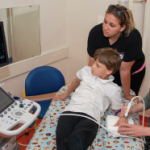The design of the certification program requires applicants to first demonstrate that they have participated in educational training that is both didactic and practical, and that explores MSUS usage for diagnosis, treatment, and guidance in the practice of rheumatology. At least 150 MSUS scans must have been completed prior to applying. It also declared this to be a certificate program by and for rheumatologists, and that all applicants must be trained in and practice rheumatology.
Eligible candidates must sit for a 100-question secure examination. Applications for certificates are accepted on a rolling basis. There are two annual month-long examination windows, one in the spring and the other in the fall. The fall testing window overlaps with the ACR/ARHP Annual Meeting dates so that candidates can schedule testing before, during, or after the annual meeting, and testing centers are located near each annual meeting site.
With content that is based on established definitions of competence, the examination is designed to be rigorous but fair. Ensuring the competence of MSUS users is one way that the ACR can help meet its goal of improving quality of care.
The RhMSUS program launched at the 2012 ACR/ARHP Annual Meeting when its candidate handbook was issued, and the application process began in February 2013. At the end of its first year the, program had 103 candidates, and 88 of them have successfully become RhMSUS certificate designees.
Those who achieve the certificate have demonstrated competency in MSUS through their education and training, and by passing an examination that tests the skills and knowledge needed to perform MSUS. The ACR is working through both its certification department and practice management and coding departments to ask for appropriate recognition of this program and its designees from payers and healthcare systems.
Beyond RhMSUS, the ACR’s Support for MSUS
Certification is not the only way the ACR supports its members and the rheumatology community in MSUS:
- Education and training: The ACR holds several small workshops at the ACR/ARHP Annual Meeting each year; two two-day fundamentals courses, and one three-day intermediate course with an interventional cadaver workshop. In addition, the ACR held two eight-month-long “Train-the-Trainer” programs to try to ensure that each rheumatology training program accredited through the Accreditation Council for Graduate Medical Education has one faculty member who is appropriately trained in MSUS to provide adequate instruction to fellows-in-training. Plans for online activities are currently being developed. Topics covered during these programs include: image acquisition and ultrasound technique; technique of ultrasound guidance; and billing, coding, and report generation.
- Reimbursement: The ACR’s staff and committees actively work on reimbursement and coding issues, including denials for MSUS and inappropriate payer policies. They are also involved with processes for the American Medical Association Current Procedural Terminology and Relative Value Scale Update Committee (RUC).
At the time I was writing this column, cuts to ultrasound guidance reimbursement contained in the “final rule” revisions to the Medicare Physician Fee Schedule for 2014 were being addressed by the ACR. The ACR is working with other specialty societies as we advocate that the Centers for Medicare and Medicaid Services (CMS) wait until after the RUC can properly survey these codes before any change is finalized.
The ultrasound guidance cuts were a unilateral decision by CMS based on estimates of ultrasound equipment costs and changes in practice expense related to equipment, facilities, and other elements. The change affects the practice expense as well as the clinical labor time for billing injection codes that were originally used to establish the direct practice expense inputs for the service. The ACR will continue to meet with CMS leaders and will discuss with lawmakers this and other issues impacting rheumatologists. - Utilization: The “American College of Rheumatology Report on Reasonable Use of Musculoskeletal Ultrasonography in Rheumatology Clinical Practice” evaluated the reasonable use of MSUS as an additional procedure in the setting of a rheumatologic evaluation and supported use of MSUS in 14 clinical scenarios.
The RhMSUS program, along with the series of educational programs and advocacy efforts, helps ACR members improve quality of care and access to care.
